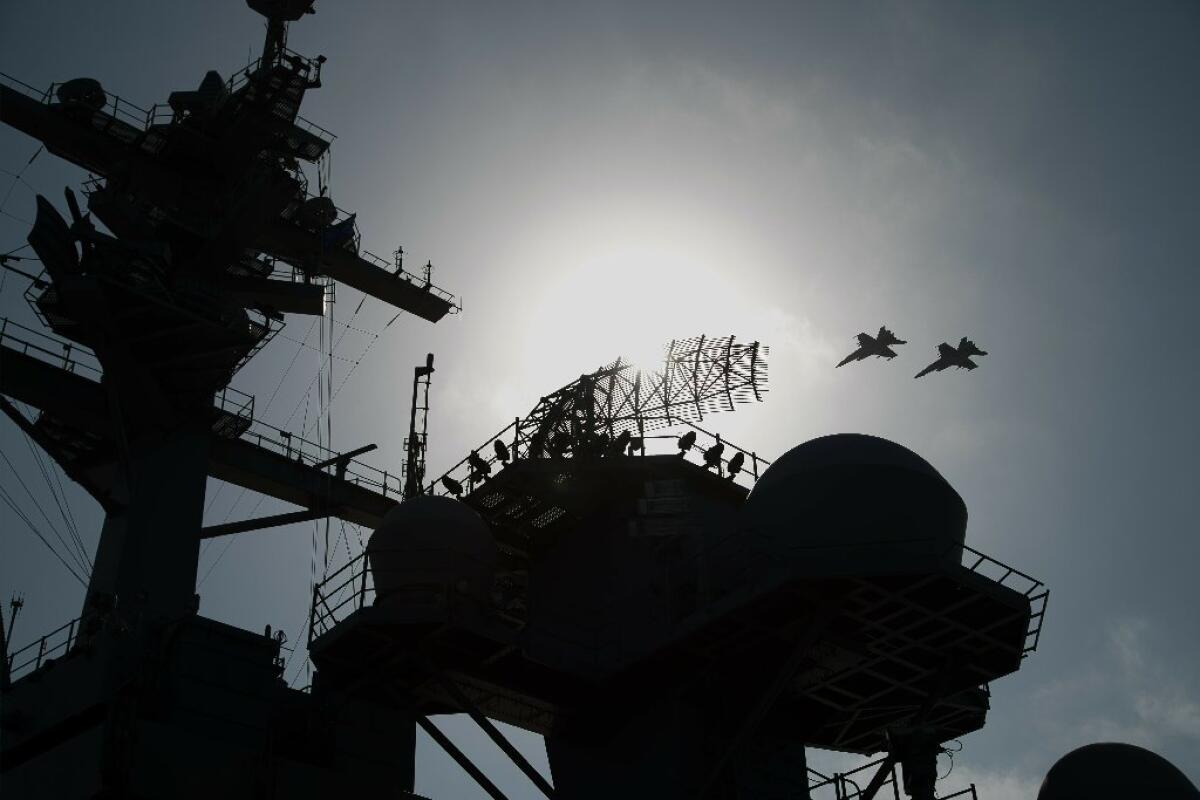Your Say: Is the U.S. too quick to threaten military action?

We have to consider the consequences
Is the U.S. too quick to use military force when conflicts arise? Yes, of course, the U.S. responds too quickly in using military force when conflicts arise. Tragically, the U.S. enters wars without considering the horrendous consequences of such actions; a peaceful solution to the dispute or conflict should always be pursued and accomplished.
When U.N. Secretary-General António Guterres served as the United Nations High Commissioner for Refugees (2005 – 2015), he observed and stated, “Peace is today dangerously in deficit.” A follow-up indicator of this peace shortage clearly shows that violent conflicts in 2018 destroyed the lives and land in nine countries: Afghanistan, Yemen, Syria, Mexico (drug war), Iraq, Somalia, Nigeria (and Boko Haram), South Sudan and Mali.
These wars in 2018 resulted in 123,643 killings, but other smaller conflicts also occurred during that same year and caused the deaths of thousands of people, according to Wikipedia. The failure to prevent war or resolve disputes led to this huge loss of human lives.
|
Next week: Your say on Election 2020 Americans just watched the first debates of the presidential election with 20 Democrats on stage over two nights. What did you think of the format, the candidates and the issues chosen for discussion? What do you want to see next? Please email us at yoursay@sduniontribune.com by 10 a.m. on Wednesday and we may publish your essay in next Saturday’s newspaper and online. Please include your full name and which San Diego neighborhood or city you live in — and a phone number that we won’t publish but may use to contact you. Thank you for joining our conversation. |
In addition to the war-related deaths, the number of individuals who fled their homes in 2018 because of war, violence or persecution totaled 70.8 million, according to UNHCR. This number exceeded that of previous years and of the 60 million refugees or displaced persons identified during the post-World War II era. The 70.8 million total consisted of 25.9 million refugees, 41.3 million internally displaced persons and 3.5 million asylum seekers. Children, including unaccompanied minors, accounted for more than 50% of the total.
Economically, the cost of war is exceedingly high. According to the Institute for Economics and Peace’s latest “Economic Value of Peace,” the economic impact of violence on the global economy in 2018 reached $14.1 trillion in purchasing power parity terms. Divided among the people of the world, the equivalent equals $1,853 for every person.
These numbers demand an answer to the question: How do we stop the quick response by the U.S. and other nations to use military force and prevent such an enormous death toll, the upheaval of millions, the high economic costs and corresponding environmental destruction? Obviously, the answer is the U.S. and other nations should not use military force when conflicts arise, but should seek peaceful solutions instead. Leaders of the U.S. and all nations need to adopt Ethiopian Prime Minister Abiy Ahmed’s statement of July 4, 2018, after decades of war with Eritrea, “We have tried war and found it useless.”
Anne Hoiberg, Point Loma
The high cost of war hurting us at home
Is the U.S. too quick to use military force when conflicts arise? Yes. I asked this at the YMCA’s Read Aloud gathering and the answer from the women was swift and short, a no-brainer.
They knew the backstory and the history of U.S. imperialism. The U.S. has engaged in endless war from the beginning, with only 17 years of peace. Perhaps it is our manifest destiny? We want something, we take it — by force and intimidation as needed. The U.S. has broken every treaty and international agreement, from tribal lands to nuclear arms to raw resources. The U.S. has a war economy, and it enriches the 1%.
President Eisenhower warned us in 1961. War makes money, and profit has more value than human lives. If there isn’t a conflict, we escalate or prevaricate to rationalize military action. Corporate media remains silent on military overreach, or worse, complicit, repeating the official narrative without investigation nor question. Venezuela, Honduras, El Salvador and Mexico suffer from covert U.S. interventions. This part of the story remains untold, perhaps due to media’s financial ties to the military-industrial big business.
|
Sign up for our Weekend Opinion newsletter: Letters and commentary policy The U-T welcomes and encourages community dialogue on important public matters. Please visit this page for more details on our letters and commentaries policy. You can email andrew.kleske@sduniontribune.com or leave a comment below. Follow @UTLetters on Twitter and UTOpinion on Facebook. |
Iran shot down a drone it claims come too close to its air space. On the face of it, U.S. denial and threats of retaliation seem understandable. The truth is in the backstory: the Pentagon plan to topple seven Mideast countries one by one, a plan decades in the making to control the oil. Remember the infamous Colin Powell speech to the U.N., with the concocted story of Iraq and Nigerian uranium? By 2019, U.S. has destabilized or militarized all but one Mideast country. All part of the plan.
The collateral cost of war has come home. The high costs of education, rampant homelessness, poverty, untreated mental illnesses and failing infrastructures are a direct product of the U.S. budget’s skewed priorities. The military consumes around 50% of discretionary U.S. spending. Naomi Klein laid out the complex web of profits, corporations, military contractors, GNP and elections in “Shock Doctrine.” The war industry drives the intensifying income inequality. It has militarized us. It has made acceptable army tanks in our streets and child prisons along our borders.
Peace is not part of the plan. Instead, the administration had a war on peace. Ronan Farrow had a firsthand view as the U.S. dismantled the State Department’s diplomacy service. There is strong popular support for peace and diplomacy. Despite the propaganda, patriotism and the revival of the unconstitutional COINTELPRO CIA program, the peace movement grows. Volunteerism for the military is at an all-time low. Conscientious objection filings are on the increase, and Selective Service filings are in decline. Protests have moved from the streets to the board rooms in divestment campaigns. New members of Congress are challenging the war business. It is time for a Department of Peace and Reconciliation.
Anne Barron, Board Member
Peace Resource Center of San Diego
People must demand some accountability
U.S. military actions around the globe, as directed by the Pentagon, have turned the United States armed forces into an endless war machine. Today our Department of Defense budget is larger than the next 10 largest countries put together, including Russia and China. In 2015 world military spending was more than $1.6 trillion and U.S. activities account for more than 34% percent of this total. Currently, the U.S. not only has the largest military budget in the world, but we are now the world’s No. 1 armaments manufacturer and arms merchant.
It all started during the Vietnam War when Robert McNamara, then head of the Department of Defense, decided to increase production of armaments and sell them abroad to help finance the Vietnam War. Many in Congress objected: as one Senator stated, “It just smells.” But McNamara defended it as “good business.” He won and set a new precedent: arms sales revenues to other countries would be used to supplement DOD revenues.
As a result, profit and patriotism were meshed together, with patriotism used as a cover for profit. Remember that “military-industrial complex” that Dwight Eisenhower warned us about so many years ago? It’s flourishing: today our military is funded not only to defend our country and to keep the peace, but wars are also funded to profit a small circle of corporations and people. Fifty plus years later, a review of the discretionary side of the 2019 federal budget, of which the military budget is a part, reveals that the DOD takes up 61%. Other departments received the following: government operations, 5%; education, 5%; diplomacy and foreign aid, 2%; and science, 2%.
Can the DOD account for this spending? Evidently not! Starting in 1990, all government departments were required to perform an annual audit but the DOD did not complete one until last year. Instead it made up numbers in its financial reports to Congress. Senator Charles Grassley, R-Iowa, stated that DOD’s failures reflects “26 years of hardcore foot dragging” where “internal resistance to auditing the books runs deep.” When Ernst & Young attempted to undertake a first audit in 2018, it concluded, according to The Nation that “the DOD’s financial records were so riddled with bookkeeping deficiencies, irregularities, and errors that a reliable audit was simply impossible.” Deputy Secretary of Defense Patrick Shanahan replied: “We failed the audit, but we never expected to pass it… It was an audit on a $2.7 trillion organization, so the fact that we did the audit is substantial.”
This statement acknowledges secrecy is preferred. This allows military force to be used inappropriately and much too often. Anything like transparency and accountability to the American people is evidently not important, or desired. I believe we as citizens must demand full accountability — not later, not someday, but now.
Paula Donnelly Roark, Oceanside
American Exceptionalism myth must end
It comes in many guises, and expansionist empires throughout history have used them to justify and sanctify their ends to a gullible public. In 19th century America it was called Manifest Destiny, or the philosophy that the United States was destined by God to expand and assert its dominion over the entire continent, naysayers be damned, full speed ahead. The updated, and more unvarnished term, is American Exceptionalism, the belief that the United States is uniquely virtuous, and vastly superior to all of the inferior countries that comprise the rest of the world, and therefore will decide what is good, and what is bad.
This ideology has been enthusiastically embraced by the same neocon war-hawks who paved the way for America’s disastrous and illegal war in Iraq, followed by Libya, Syria, all of which were preceded by our longest debacle, Afghanistan. This does not include the myriad of smaller secret wars we are engaged in around the world, many that are being waged without the knowledge or consent of Congress, and in some cases, the president. If there were true justice in the world, then John Bolton, Mike Pompeo, Elliot Abrams, Barack Obama, Hillary Clinton, George Bush, and numerous government officials and politicians would be languishing in a cell at Guantanamo Bay, guarded by the spirits of the millions of innocent people who were victimized by their grandiose vision of American Exceptionalism.
American Exceptionalism, our foreign policy ideology, is powered by fear. Americans are inundated 24/7 with propaganda, lies and deceptions by our government, and the mainstream media willingly acts as a stenographer and megaphone for the governments message. The consolidation of mainstream media, and corporate takeover, has hastened the demise of good journalism, thereby denying the American public of an honest, forthright and factual view of our governments actions, especially when it comes to our foreign policy.
Finally, for those Americans who worship at the altar of American Exceptionalism, I leave you with this quote, “If certain acts and violations of treaties are crimes, they are crimes whether the United States does them or whether Germany does them. We are not prepared to lay down a rule of criminal conduct against others which we would not be willing to have invoked against us.” Justice Robert H. Jackson, Chief Prosecutor, Nuremberg War Crimes Trials
Rodney Devereux
Del Mar
Editor’s Note: Due to technical issues with our email system, it is possible that some reader essays readers did not reach us this week. We apologize.
Get Essential San Diego, weekday mornings
Get top headlines from the Union-Tribune in your inbox weekday mornings, including top news, local, sports, business, entertainment and opinion.
You may occasionally receive promotional content from the San Diego Union-Tribune.












